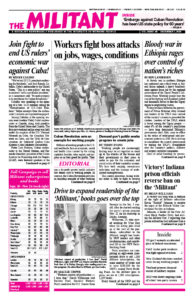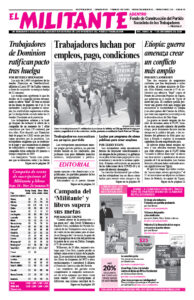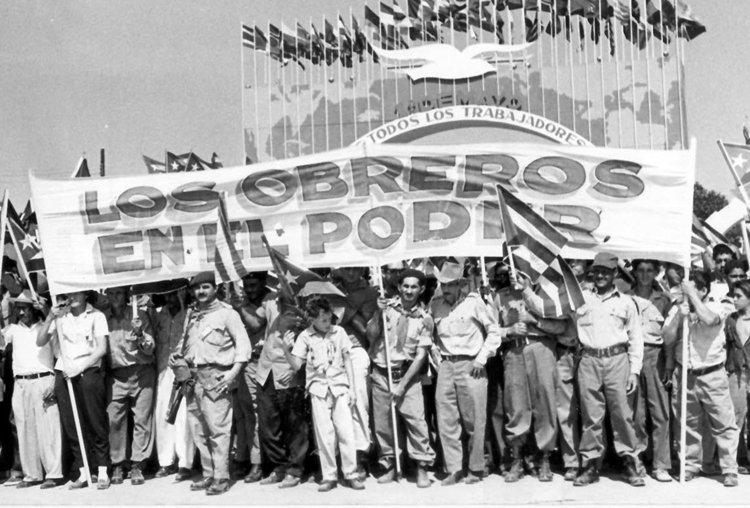“We’ve had 12 U.S. presidents enforcing the blockade,” said José Ramón Cabañas, Cuba’s ambassador to the United States. “This is a state policy,” not one associated “with a particular president,” as is sometimes said. “Its main purpose is to overthrow the Cuban Revolution.”
Cabañas was speaking at the opening of a Nov. 14-15 webinar calling for “Normalization of U.S.-Cuba Relations.” Major excerpts from the ambassador’s remarks are reprinted on page 6.
Joining Cabañas at the opening session were Josefina Vidal, Cuba’s ambassador to Canada, along with panelists from the United States and Canada. The four-part weekend online event was held under the auspices of the U.S. National Network on Cuba, the Canadian Network on Cuba, and the Table de Concertation de Solidarité Québec-Cuba (Quebec-Cuba Solidarity Roundtable).
Pedro Luis Pedroso, Cuban ambassador to the United Nations, and Fernando González, president of the Cuban Institute for Friendship with the Peoples (ICAP), were featured speakers at the closing session.
Cabañas and the other Cuban representatives focused on opposition to Washington’s six-decades-long economic war aimed at weakening and overturning the socialist revolution. “President-elect Biden and his entourage must know,” said Vidal, “that the U.S. blockade is the main obstacle to developing a sustainable relationship between Cuba and the United States,” as it has been during every U.S. administration since the 1959 revolutionary victory.
If that fundamental U.S. government policy is not ended once and for all, said Cabañas during the question-and-answer period, “we’ll have executive orders in one direction for four years. Then the next administration will have executive orders in the opposite direction for four years.”
“No other country has endured for so many years such a comprehensive set of economic sanctions by any power as Cuba has,” said Pedroso. “Eighty percent of the Cuban people were born and have lived their entire lives under the effects of the blockade. Three generations of Cubans have suffered for freely choosing our political, economic, and social system, exercising our right to self-determination.”
Fernando González encouraged opponents of Washington’s hostile policies against Cuba to build actions around the May 2021 U.N. General Assembly session, where the Cuban government will present an annual resolution for an end to the U.S. embargo, which has been adopted overwhelmingly since 1992.
He urged participation in picket lines against Washington’s policies on the 17th of each month in front of U.S. consulates or government buildings. The date is associated with Dec. 17, 2014, when Cuban President Raúl Castro and U.S. President Barack Obama announced talks aimed at restoring diplomatic relations between Washington and Havana. That same day the last three of the Cuban Five revolutionaries, who spent up to 16 years in U.S. prisons, were released after a worldwide campaign on their behalf.
González said ICAP is preparing, as soon as conditions allow, to host brigades from the United States and other countries to visit Cuba, as in previous years. These include the May Day International Brigade, the Venceremos Brigade, and the IFCO/Pastors for Peace Friendshipment Caravan. ICAP and other Cuban mass organizations are ready to welcome young people, trade unionists, and others who want to see for themselves the truth about the Cuban Revolution, González said. He also encouraged efforts to get city and state legislative bodies and trade unions to pass resolutions opposing the U.S. embargo.
The webinar kicked off with a concert Friday evening featuring prominent Cuban artists from the island who were joined by musicians and poets from the U.S. and Canada. The weekend included a Saturday night session on Cuba’s medical system and internationalist solidarity, including the importance of Havana’s Latin American School of Medicine and brigades of volunteer Cuban doctors and nurses who have joined the fight against the COVID-19 epidemic in some 40 countries.
Much of the weekend program was aimed at drawing opponents of the U.S. government’s effort to punish the Cuban people for their revolution into capitalist electoral politics and lobbying. Some lauded the retreat of many Cuba solidarity forces into the virtual world of webinars and online “activities” as a major expansion of outreach efforts.
Others, however, focused on the need for actions — in the streets and at public meetings, where people mobilize, meet each other, exchange experiences and debate a way forward — as the road to educating about the Cuban Revolution and winning broader layers of the population to join in opposing Washington’s decadeslong policies.
The Sunday session of the webinar closed with reports from leaders of Cuba solidarity groups in Latin America and other countries.


